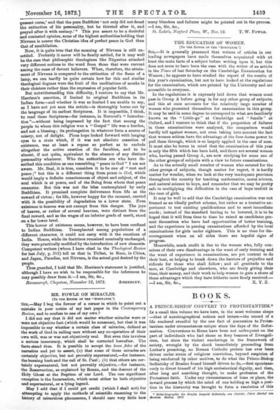THE EDUCATION OF WOMEN.
(TO THE EDITOR OF THE ' SPECTATOR:) SIR,—It is generally presumed that writers of articles in our
leading newspapers have made themselves acquainted with at least the main facts of a subject before writing upon it, but this does not seem to have been the case with the writer of an article in the Times of last Saturday on the Cambridge Examination for Women ; he appears to have studied the report of the results of this year's examination, but not to have looked at the regulations for the examination, which are printed by the University and are accessible to everyone.
In the regulations it is expressly laid down that women must
pass in Group A before going in for any other group of subjects, aud this at once accounts for the relatively large number of women who presented themselves for examination in this group. It may be said in some degree to correspond to what are familiarly known as the " Little-go " at Cambridge and " Sinalls " at Oxford, and I venture to think that if the proportion of failures in these examinations were analysed, the comparison would hardly tell against women, not even taking into account the fact that women seldom have the advantage of the four-horse power to pull them through, which is so largely applied in the case of men. It must also be borne in mind that the examination of this year is only the fifth which has been held, and there are several women who, having passed Group A, are now studying for some one of the other groups of subjects with a view to future examinations.
As to the actually small number of women who entered for the other groups of subjects, though matter for regret, it is hardly matter for wonder, when we look at the very inadequate provision throughout the country for teaching mathematics, moral science, and natural science to boys, and remember that we may be pretty safe in multiplying the difficulties in the case of boys tenfold in the case of girls.
It may be well to add that the Cambridge examination was not framed as an ideally perfect scheme, but rather as a tentative ex- periment to test existing qualifications and to meet immediate needs ; instead of the standard having to be lowered, it is to be hoped that it will from time to time be raised as candidates pre- sent themselves who have had opportunities of better training, and the experience in passing examinations afforded by the local examinations for girls under eighteen. This is no time for dis- couragement when on all sides there are hopeful signs of progress.
Meanwhile, much credit is due to the women who, fully con- scious of their own disadvantage in the want of early training and the want of experience in examinations, are yet content to do their best, so helping to break down the barriers of prejudice and ridicule for those who hall follow ; and all gratitude to the men, at Cambridge and elsewhere, who are freely giving their time, their money, and their work to help women to gain a share of those advantages which they have hitherto more freely received.—


































 Previous page
Previous page